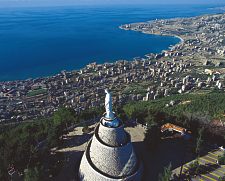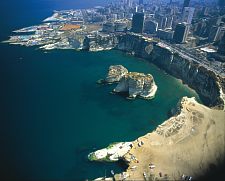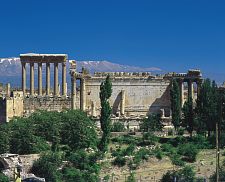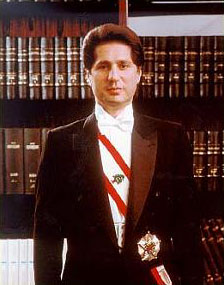|





| |
The Playboy of Metn Loses his Sex
Appeal
Amin Gemayel: The Crushing End of a Career in Politics
by Ashmole* | CDL August 6, 2007
Print in PDF
Factoid: Amin Gemayel was President of Lebanon from 1982
to 1988. He is the son of Pierre Gemayel, founder of the Kataeb Party. Gemayel
political career began officially in 1969 when he was
elected, in a by-election, to succeed his deceased uncle Maurice Gemayel, as a
member of the National Assembly (Lebanese Council of Deputies); he was reelected
in 1972. On September 21, 1982, he was elected President of the Republic of
Lebanon by the National Assembly to succeed his brother Bachir Gemayel who had
been elected the previous month but had been assassinated before
taking office. Gemayel’s Presidency was marked by inefficiency, weakness, wars
and corruption; it ended in total chaos in 1988, after which Gemayel went into
exile. In 2000, he brokered an agreement with current President Emile Lahoud and
the Syrian authorities controlling the country to allow him to return to Lebanon
and lay low. In 2005, he tried to reclaim his dad’s seat at the helm of the
Kataeb Party. After a bitter fight with the rival factions of the party and
through a surreptitious arrangement with Karim Pakradouni, the current president
of the Party, Amin Gemayel was named “Higher President of the Kataeb Party”. On
August 5, 2007, the “Higher President” ran for elections in the Metn district to
fill a seat vacated by his slain son Pierre (assassinated in 2006); he lost to a
physician of the Free Patriotic Movement, Dr. Camille Khoury, a relative unknown
in national politics.
Down Memory Lane
Those who grew up in Metn in the seventies through the mid-eighties remember -
with fondness - the nickname of the elder son of Pierre Gemayel: “The Playboy of
Metn.” A title that young Amin, good looking and always preoccupied with his
hair, earned as a philanderer who could not keep his zipper closed; a title he
would carry with him into the Presidency Palace in Baabda as allegations of
adultery between President Gemayel and the wife of a prominent business partner
were whispered throughout the country.
The first time I met Amin Gemayel in person was in the late seventies; he was
then president of the Metn Sector in the Kataeb Party. My dad had been invited
to a town meeting with him and he took me along. I was then a young
impressionable boy in my early teens, very excited at the prospects of a close
encounter with Sheikh Amin. In fact, I sat next to my dad in the front row and
at the end of Gemayel’s speech, when he came to shake my dad’s hand, I made sure
I introduced my self and shook his hand. For me, at the time, he was a hero of
the “Lebanese Resistance” (in reality Christian Resistance) against the Lebanese
Muslim, the Palestinian, the Syrian, the Lybian, and most of the Arab and
Islamic world who wanted collectively to uproot the Christians from Lebanon,
turn it into an Islamic state and give it to the Palestinians. Abu-Ammar, Saeb
Salam and Kamal/Walid Jumblat said little to appease those fears and did a lot
to inflame them. Deep down, however, I always admired Bashir - Amin’s younger
brother and the founder and last leader of the “Lebanese Forces” - but Amin was
the only available choice that evening. Growing in the Christian ghetto in the
1970s-80s, the choices of national leaders were dictated mainly by 2 radio
stations: “Voice of Lebanon” and “Radio Free Lebanon” one for Pierre/Amin and
one for Bashir. That was before I discovered “Voice of Arab Lebanon” and Sheikh
Mouhammad Ali El-Jouzo’s Fridays Sermons. Later, after Amin and Samir Geagea
lost the “War of the Mountain” to Walid Joumblat and the Syrians and the
so-called National Forces, I tuned to the “Voice of the Mountain” and there was
Ghazi El-Aridi.
Ironically, today, Amin, Samir, Walid, Ghazi and others
have reinvented themselves and joined in the same group as if nothing has
happened. They have reached a power-sharing agreement that guarantees their
clans a share of the pie and we the people were left without homes, without
remuneration, without jobs, without hopes and without a country.
March 14, 2005: The Death of a Popular Uprising and the Birth
of an Unpopular Coalition
Most of those involved in the Lebanese affairs remember vividly the popular
uprising of March 14, 2005. More than 1 Million Lebanese took to the streets of
the capital Beirut to protest the Syrian occupation of the country, to demand an
investigation into the assassination of Rafik Hariri and as a show of mass power
in face of the Hezbollah-led March 8 demonstration. At the time, the Sunni
leader Saad Hariri had not been invented yet, the Christian leader Michel Aoun
was still in exile and the Shiites did not show up. The Druze clan was led into
the demonstration by its leader Walid Jumblat, and the Sunni clan by Bahia
Hariri and the Future Movement. The Christians took to the streets that day on
their own as individuals or in small self-organizing groups, whose true
leadership lied within but for some odd reason many among them believed it to be
somewhere else (in exile or in prison). Of course Amin did not show up that day,
he was busy arguing with Karim Pakradouni over the seat of his father Pierre
Gemayel. But there was Walid Jumblat, Gebran Tueini and Bahia Hariri in addition
to a handful of “second row” speakers.
The echo of the March 14 uprising, “The Cedar Revolution” as it came to be
known, resounded throughout the world and sent its shockwaves into the Arab
World with fears of similar uprisings sprouting here and there and demanding
freedom and democracy. A decision was made – somewhere in the coulisses of a
royal palace in the Arab Desert - that the popular uprising in Lebanon must be
contained lest it spreads beyond the border. The establishment was rushed in to
contain it and take it out the hands of the people:
Saad Hariri was invented and endowed with his father’s wealth!
Amin Gemayel was resurrected and bestowed his father’s seat!
Samir Geagea was released and pardoned of his sins!
Walid Jumblat was tamed and promoted to Orchestra conductor!
The “March 14 Coalition” was born… It replaced the
Cedar Revolution and became “L’ Ordre du Jour”.
I still cannot figure out Michel Aoun’s role; did he just refuse to play the
dirty game of the establishment - once again - or does every game need a “Joker”
to bypass the rules? Only history will tell.
A number of assassinations followed, most prominent among those was the
assassination of Gebran Tueini, editor-in-chief of Annahar Lebanese Daily
Newspaper – may his soul and the soul of Annahar and that of the Freedom of
Speech in Lebanon rest all in peace.
Another assassination claimed the life of Pierre Gemayel, Amin’s eldest son, a
young and vibrant man who followed in the footsteps of his dad. Pierre was
elected to the Maronite parliamentary seat in Metn in 2000, under Syrian
occupation, and again in 2005 after Aoun’s Block of Reform and Change spared a
seat for him. Earlier in 2007, another assassination would claim the life of MP
Walid Eido and his son.
In addition to the assassination of talented individuals many of whom held the
promise of leadership, there was a surge in the number and activities of leader-wannabe(s),
gifted only with a severe constipation of the mind and an profuse diarrhea of
the mouth; they all became members or leaders of the “March 14 Coalition”. To
name a few for example, in random order of irrelevance: Michel Moawwad, Dori
Chamoun, Roger Eddeh, Fares Seayd, Wael Abu Faour, Akram Shehayyeb, and many
others. You see them almost daily spewing their empty rhetoric through the
establishment’s news outlets be it the Future TV, the Lebanese Broadcasting
Corporation (LBC), Annahar Newspaper and other establishment media outlets. They
are mostly referred to as “the second or third row” politicians. Meaning they
have no opinion of their own and even if they had one, it makes no difference
whether they express it or keep it to themselves. They follow the leader of
their clan or bark at his door praying for a bone - in Lebanese political terms
of course (in Lebanon, “in politics” you can lose an election and still claim
victory).
The People versus the Establishment
This so-called “March 14 Coalition”, after hijacking the popular uprising of
March 14, 2005, deluded itself in its popularity and its representative capacity
and gradually alienated the popular base. The main reason for the alienation was
lack of trust in the neo-reformers: most of the “March 14 Coalition” today
consists of warlords, war criminals, pseudo-intellectuals, feudal lords, deep
pockets, corrupt businessmen and empty drums that beat without rhythm for any
drummer. Even the young ones among them, like Michel Moawwad, have bypassed the
requirements of modern politics and strategic leadership, and instead of seeking
higher education at prominent institutions of public policy to become better
public servants, they simply play the role assigned to them by their master,
whoever that may be.
On the other hand, 2 main political groups emerged: One of the disintegration of
the Cedar Revolution and led by Michel Aoun (Free Patriotic Movement); and the
other of the disintegration of the March 8 coalition and led by Hassan Nasrallah
(Hezbollah).
Accusations and labels aside, these two groups have one thing in common: they
both represent populist and popular, anti-establishment movements who were born
in the trenches of popular agony and claim to have survived the rough waters and
shifting sands of Lebanese politics. They may be guided by different ideologies
and philosophies (one secular and the other religious) but they have met on a
set of principles that join their bases together. Today they give us a glimpse
of the future if Lebanon is to survive as a democracy: they represent the
nucleus of a national populist party, which joins the faithful, the
intellectual, the poor and the progressive. This populist party stands in stark
opposition to an establishment party - made largely of the March 14 Coalition -
and consists mainly of feudal lords, heirs to wealth and family names, wealthy
ignorami (plural of ignoramus), leader wannabes and social leeches who cling to
the establishment hoping to exploit the system and reap the benefits.
Two major party coalitions: “a progressive populist party versus a conservative
elitist party.”
The Elections of August 5, 2007
These elections reflected 2 states of mind on the Lebanese scene today:
In Beirut, although the Hariri candidate won by a margin typical of the
totalitarian regimes in the Arab World (>82%; Assad of Syria won by ~ 93%), the
participation rate in the Beirut by-election was less than 18%; indicating that
Hariri and the "March 14 Coalition" scored less than 15% of the vote. This
miserable turn-out in a time of high political tension reflects a depressed mood
of the Sunni voter in Beirut who found himself at a loss of serious choices for
MPs: either go with Itani (Hariri’s candidate) or stay at home. A majority
preferred to stay at home.
In Metn, the battle was far more interesting. The two evolving superpowers in
Lebanese politics (Conservative Elitist versus Progressive Populist) came
clashing face to face at the polling booths: the establishment and the March 14
Coalition represented by Amin Gemayel on one hand, and the progressive populist
movement represented by the Free Patriotic Movement and his allies (Michel Murr,
Tachnag, and Hezbollah) on the other. This election was poised to be the best in
the modern history of Lebanon, were it not for instances of abuse of the media
by the establishment’s candidate. Gemayel and allies filled the news media
outlets (written, spoken and seen) uncontrollably with speeches, rumors,
misinformation and innuendos by their supporters, old and new (I had to stop
watching LBC and reading Annahar and L’Orient Le Jour for a while to preserve my
sanity; I never considered the Future media outlets to be serious so I had no
problem with those); they snitched Bkerki’s support (willingly or
reluctantly) on the basis of tradition and respect for the dead; they
capitalized on the sympathy of the Metn voter with their family for the
assassination of Pierre. Many of their practices broke the electoral law but the
establishment turned a blind eye. They rallied every political hopeful whom Aoun
did not choose on his ticket in 2005 and brought them to Metn in the fiercest
anti-Aoun campaign I have seen since the attack by Geagea Forces on the Lebanese
Army in 1990. They literally used every trick in the book of election history in
Lebanon.
…They lost! The “March 14 Coalition” lost! Amin Gemayel lost!
For the first time in his political career, Amin Gemayel could not inherit a
political seat left vacant by a deceased member of the family (he had inherited
in the past his uncle Maurice, his brother Bashir, his father Pierre and was
hoping to inherit his son Pierre).
Amin Gemayel was defeated!
Instead of graciously accepting defeat, bowing to the will of the majority and
congratulating the winner, Amin was furious; he lost his cool and he looked for
a scapegoat to blame for his unpopularity in a district where people, like me,
grew up on the legends and heroism of Pierre Gemayel (senior), his family and
his party. Amin’s campaign with all the support of the “March 14 Coalition”
unraveled and Amin revealed his true self in a moment of truth.
When all inhibitions are off and real emotions surface, a man’s true identity is
revealed.
After his loss, Amin Gemayel revealed his true identity. He showed himself to be
a hypocrite bigot. He launched a prejudiced ethnic attack on a small minority
group of Armenian Christians who voted for Camille Khoury, Aoun’s candidate.
But Amin was not alone in his prejudice and racially and ethnically charged
attacks; his ally Gabriel Murr launched a similar attack against the Armenian
Christian voters. When I heard Gabriel Murr and Amin Gemayel on TV attacking the
Armenian Christian minority, I was reminded of Hitler and the Nazis blaming the
Jews for the lot in Germany in 1930s. But why go so far and compare these dwarfs
to Hitler? Their close ally, Walid Jumblat (self-proclaimed leader of the
democratic coalition), had made a declaration of civil war in 2005 following
early results of the Baabda-Aley district elections and before the
Shiite/Hezbollah vote from the Southern Suburb of Beirut carried him to victory.
Then, Joumblat considered the vote by the Christians of Baabda-Aley against him
and his possible loss of 7 parliamentary seats as a prelude to a civil war. He
made the threat openly on LBC. Walid Jumblat, Amin Gemayel, and Gabriel Murr are
but the icing on the bigoted core of the “March 14 Coalition”. They hate
everything and everyone that does not serve their personal and family interests.
For the first time in his life, Amin Gemayel stood naked in front of the voters,
after the by-election results, and he looked ugly; the Playboy of the Metn has
lost his sex appeal.
* Ashmole: traveler,
antiquary, politician, officer of arms, student of astrology, alchemy and para-psychology;
collector of curiosities and artifacts.
|